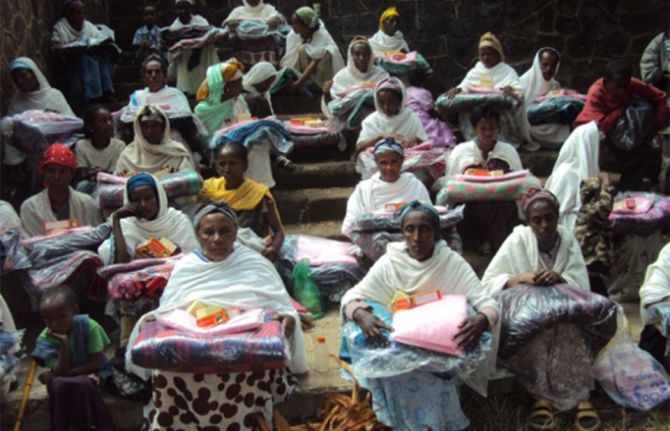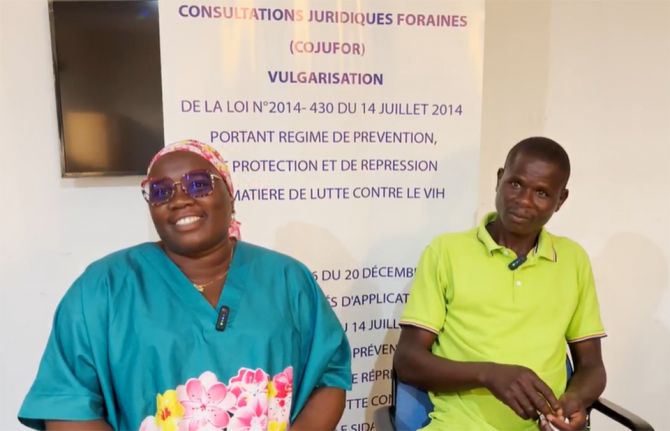
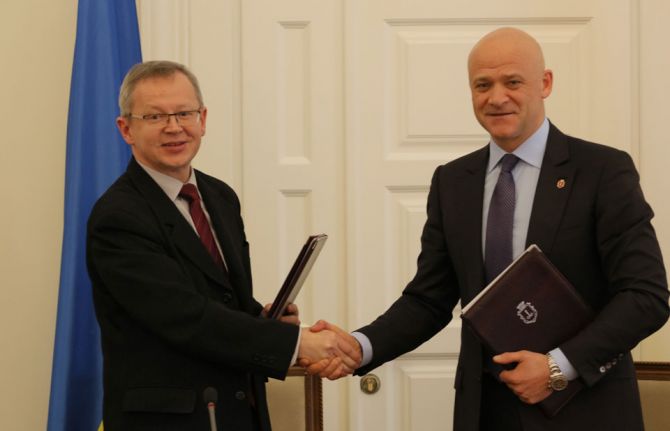
Update
Odesa signs Paris Declaration on Fast-Track cities
17 March 2017
17 March 2017 17 March 2017Odesa in Ukraine has become the latest city to sign the Paris Declaration to end the AIDS epidemic in cities. Since the end of 2014, more than 200 cities around the world have signed the Paris Declaration and are addressing the significant disparities in access to basic services, social justice and economic opportunity towards ending the AIDS epidemic.
In signing the Paris Declaration, the Mayor of Odesa, Gennadiy Trukhanov, committed to putting Odesa on the Fast-Track to ending the AIDS epidemic through a set of commitments that include achieving the 90–90–90 targets, which will result in 90% of people living with HIV knowing their HIV status, 90% of people who know their HIV-positive status on antiretroviral treatment and 90% of people on treatment with suppressed viral loads.
Ukraine has the second largest HIV epidemic among eastern European and central Asian countries and accounts for 19% of the total number of people living with HIV in the region. According to the Ministry of Health, there are 11 313 officially registered people living with HIV in Odesa, but only 3889 are receiving antiretroviral therapy.
As a result of the city’s commitment to the Paris Declaration, antiretroviral therapy will be provided to all people living with HIV free of charge through state medical institutions. The scale-up in antiretroviral therapy coverage will be possible as a result of an increase in the state budget allocation for antiretroviral therapy (a 132% increase in 2017), antiretroviral therapy co-financing by partners such as the United States President’s Emergency Plan For AIDS Relief and the Global Fund to Fight AIDS, Tuberculosis and Malaria and a reform of the health system and antiretroviral therapy decentralization. Antiretroviral therapy will be provided by family doctors, which will increase the number of patients that will be covered. Furthermore, the optimization of the treatment protocols and the cost reductions of antiretroviral medicines as a result of improved state procurement systems will also contribute to providing more access to treatment.
Odesa is the second city, after Ukraine’s capital, Kyiv, in the eastern Europe and central Asia region to join the Fast-Track cities initiative. The signing ceremony was attended by representatives of the national and local government, including members of the Kyiv city administration. The event was also attended by the United Nations Secretary-General’s Special Envoy for AIDS in Eastern Europe and Central Asia, Michel Kazatchkine, United Nations representatives, and members of civil society, business and media organizations.
Quotes
“The city is ready to take on the responsibilities of a Fast-Track city. We have good cooperation between municipal services and HIV services and established a powerful partnership with civil society that will allow us to embody all these obligations.”
“By signing the Paris Declaration, Mayor Gennadiy Trukhanov is encouraging mayors of another eight cities of Ukraine with a high HIV burden to join the initiative and sending a strong signal on the importance of overcoming the AIDS epidemic as a necessary condition for achieving sustainable development of cities and local communities.”
“Congratulations to the city of Odesa for its bold commitment today. Bringing together the efforts of public health and civil society within the frame of the Fast-Track cities initiative will be key to progress in the response to HIV in the region. It is also a factor for social progress, social transformation and progress towards more social equity in large cities.”
“As new HIV cases continue to increase in eastern Europe and central Asia, the epidemic is focused on major cities. Concentrated among key populations and their sexual partners, particularly people who inject drugs, this can be reversed if cities get on the Fast-Track to end AIDS. The leadership of the city of Odesa is the kind of immediate and decisive leadership needed to Fast-Track its AIDS response by 2020.”
Region/country
Related

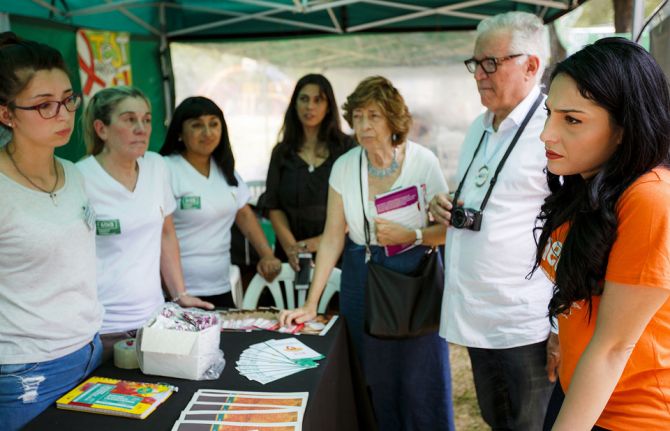



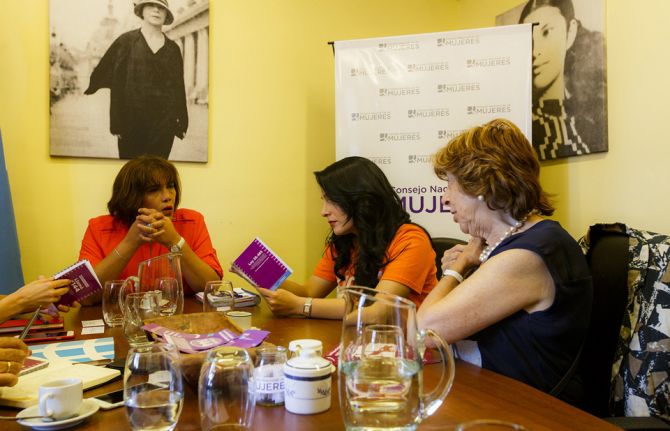
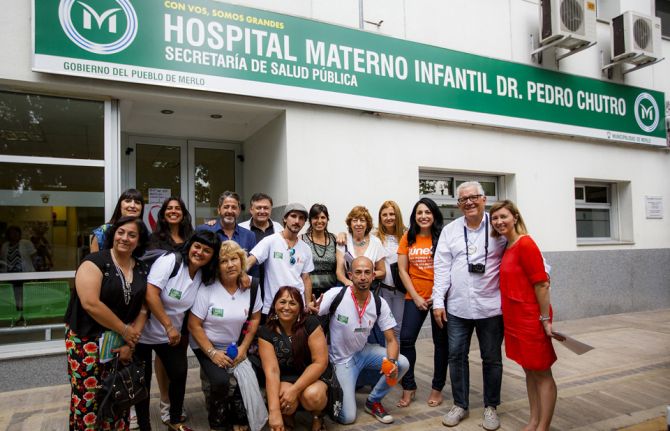
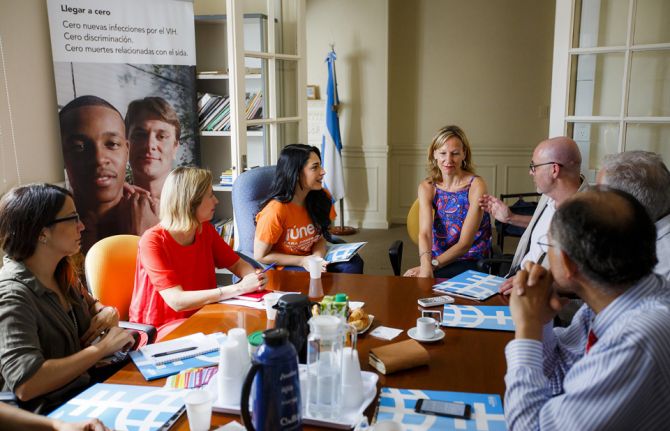
Update
Supporting survivors of violence in Argentina
15 March 2017
15 March 2017 15 March 2017As the sixty-first session of the Commission on the Status of Women gets underway at the United Nations Headquarters in New York from 13 to 24 March 2017, UNAIDS highlights the urgent need to respond to gender based violence and HIV.
Through her work as a journalist, Alejandra Oraa, CNN news anchor and UNAIDS Goodwill Ambassador for Latin America and the Caribbean, has reported on many stories about women and violence in the region. Shortly after thousands of people took to the streets in October 2016 to protest against widespread violence against women in the country, she undertook a joint UNAIDS and UN Women mission to Argentina to meet with not only survivors of violence but also the groups and organizations working with them.
“In the region we have made progress to respond to gender-based violence, but, unfortunately, there is still a long way to go. I hope that our voices and examples change a statistic that shames Latin America,” said Ms Oraa, who is also a spokesperson for UN Women’s Orange the World campaign to raise money to respond to violence against women.
Gender-based violence remains one of the key development challenges in the region. In 12 Latin American and Caribbean countries, between 17% and 53% of women interviewed reported having suffered physical or sexual violence by an intimate partner. In seven of the countries, more than one in four women reported such violence. Gender-based violence is not only a human rights violation, it also makes women and girls more vulnerable to HIV infection.
Ms Oraa’s first stop was in Merlo, in the greater Buenos Aires area, which has the highest HIV prevalence in Argentina. There, she learned about how UNAIDS and UN Women are supporting local projects that integrate programmes responding to violence against women, promote gender equality and expand access to HIV prevention services, all of which are inextricably linked.
Ms Oraa met with the local organization of people living with HIV, which helps to run a free and confidential HIV testing site during health fairs organized by the Municipality of Merlo in different parts of the town, making it easy for anyone to access an HIV test.
During the visit, Marcela Alsina, President of the network of people living with HIV (Red Bonaerense de Personas que Viven con VIH), together with other representatives of the organization, spoke to Ms Oraa about how stigma and discrimination are affecting the ability of women living with HIV to access employment and health services.
“Despite progress in the HIV response, there are still important gaps and inequalities that limit women living with HIV from having full access to employment, motherhood and comprehensive health services. When HIV becomes a priority, as it is happening in Merlo, we see that stigma and discrimination starts to decrease and the quality of life of people living with HIV starts to improve,” said Ms Alsina.
Ms Oraa visited the HIV testing centre of the Dr Pedro Chutro Maternal and Paediatric Hospital in Merlo. The centre, through a joint team with support from the Ministry of Social Development, civil society and the Women’s Commissioner Office, promotes the integration of HIV services with services to prevent violence against women. It also offers outreach activities and support groups for women and children affected by violence and HIV.
In Buenos Aires, Ms Oraa met with Fabiana Túñez, President of the National Council for Women, and Mabel Bianco, Director of FEIM, a nongovernmental organization supporting women’s and children’s rights. They talked to Ms Oraa about the importance of a joint and coordinated response to HIV and gender-based violence in Argentina to ensure that the country can end its AIDS epidemic by 2030.
Ms Oraa also spoke to internationally renowned Argentine singer Diego Torres, a spokesperson for the HeForShe campaign for gender equality, who talked passionately about the importance of involving men in stopping violence against women and gender equality in Argentina.
“We have to ensure that men and women enjoy equal opportunities in different aspects of life, for example in the labour market and in politics. This is what I believe in and stand for,” said Mr Torres.
Resources
Region/country

Update
Where History is Made campaign renewed
01 March 2017
01 March 2017 01 March 2017The hotel InterContinental Geneva and UNAIDS have agreed to continue their partnership to highlight the urgent need to increase efforts to keep children free from HIV. At a signing ceremony held at UNAIDS headquarters in Geneva, Switzerland, attended by the Executive Director of UNAIDS, Michel Sidibé, and the General Manager of the InterContinental Geneva, Jurgen Baumhoff, UNAIDS and the InterContinental Geneva committed to continue their Where History is Made alliance.
Where History is Made is a public–private partnership that focuses on ensuring that all children are born free from HIV, that their mothers have access to life-saving medicines and that all children living with HIV lead healthy lives. The collaboration has helped to raise visibility and new funds for UNAIDS’ work since 2013.
Quotes
“The AIDS response needs to unlock untapped potential and maximize contributions from non-traditional donors to Fast-Track the AIDS response. The partnership with the hotel InterContinental Geneva has unlocked new opportunities for philanthropic and programmatic engagement and mobilized new actors for change.”
“Private sector companies can be a catalyst for social change in the response to AIDS. We hope that our partnership will inspire and mobilize other companies to engage their employees and clients towards ending AIDS as a public health threat by 2030.”
Campaigns
Region/country
Related
 Government ensures continuity of treatment in Malawi
Government ensures continuity of treatment in Malawi

10 February 2025

Update
Hospitals in South-East Asia ramp up efforts against HIV-related stigma
02 March 2017
02 March 2017 02 March 2017The Bamrasnaradura Infectious Disease Institute in Nonthaburi is one of Thailand’s premier hospitals in AIDS treatment and care. Its waiting rooms welcome many patients. This month, people waiting for appointments will see on hospital screens stories about people living with HIV who overcame stigma thanks to support from their communities. Bamrasnaradura is one of around 1000 hospitals in Thailand that have joined the zero discrimination in health-care settings campaign.
The Ministry of Public Health of Thailand, the Thai Network of People Living with HIV/AIDS (TNP+) and UNAIDS launched the campaign on 2 March at Bamrasnaradura.
“More than 30 years since HIV was detected in Thailand, stigma still remains a major challenge,” said Jessada Chokdamrongsuk, Director-General, Department of Disease Control, Ministry of Public Health. “Thailand is committed to ensuring health-care settings are safe and supportive environments.”
The campaign features a video with a short message from the popular Thai singer and UNAIDS National Goodwill Ambassador for Thailand, Chalatit Tantiwut, in which he encourages everyone to join the zero discrimination movement.
“Discriminating against anybody for any reason is always out of bounds,” said Mr Chalatit. “Making music is what I do best and I think it’s my duty to contribute to society and make some noise about zero discrimination.”
This initiative is part of an ongoing effort by the Ministry of Thailand to tackle stigmatizing behaviours and attitudes among staff towards people living with HIV. A survey of 1600 Thai health-care workers showed that more than 60% of workers feared an HIV infection while performing routine tasks and 90% admitted to at least one stigmatizing attitude.
The Ministry of Public Health, with support from civil society, UNAIDS and the United States Agency for International Development, has developed a comprehensive stigma reduction programme that is gradually being scaled-up to include all public hospitals.
“Thailand is showing how to tackle HIV-related stigma and discrimination in hospitals and clinics, “said Tatiana Shoumilina, UNAIDS Country Director for Thailand. “This problem is persistent and pervasive in many parts of the world. Only by overcoming this challenge will we Fast-Track the response to HIV and end the AIDS epidemic as a public health threat.”
“Zero Discrimination Day on 1 of March is now a well-recognized event both in Thailand and globally,” said Apiwat Kwangkaew of TNP+. “However, I would like to urge people to practice zero discrimination every day. Fear of HIV transmission and prejudice against people living with HIV are holding back access to treatment and care, employment and education.”
Thailand’s HIV-related stigma reduction programme for health-care workers is one of the world’s most ambitious initiatives and it has been such a success that it is being adapted and implemented in other South-East Asian countries.
After a survey in 2014 of people living with HIV found that stigma and discrimination in health-care settings was a significant issue in Viet Nam, health officials started exploring best practices and the Thai model seemed a good example.
In Ho Chi Minh City, the Viet Nam Administration for AIDS Control, with support from UNAIDS, has started pilot-testing the programme. The initiative began with a survey of three hospitals in the city, which led to a programme for health workers tailored to the Vietnamese context. A training in how to capacitate health-care workers to reduce stigmatizing attitudes and behaviours is under way in the city from the 28 February to 3 March.
“We will conduct an assessment at the end of this pilot project. I hope the lessons learned from this pilot will help further improve the methodology of measuring HIV-related discrimination in health-care settings and programme approaches, so we can expand the practice nationwide,” said Hoang Dinh Canh, Vice-Director, Viet Nam Administration for AIDS Control.
The Lao People’s Democratic Republic is also adapting Thailand’s initiative and Myanmar has expressed an interest in a similar approach. Discrimination is a barrier to accessing health services for people living with HIV globally, which is why UNAIDS dedicated this year’s Zero Discrimination Day on 1 March to elimination discrimination in health-care settings.
Region/country

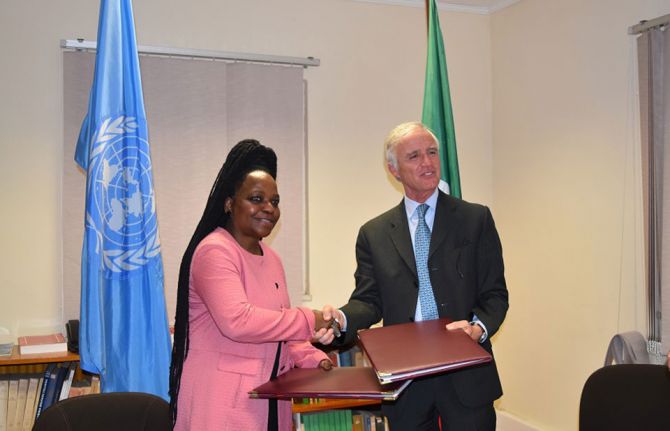
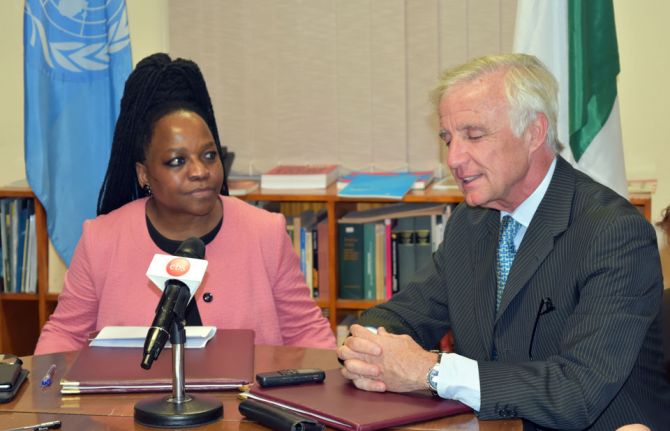
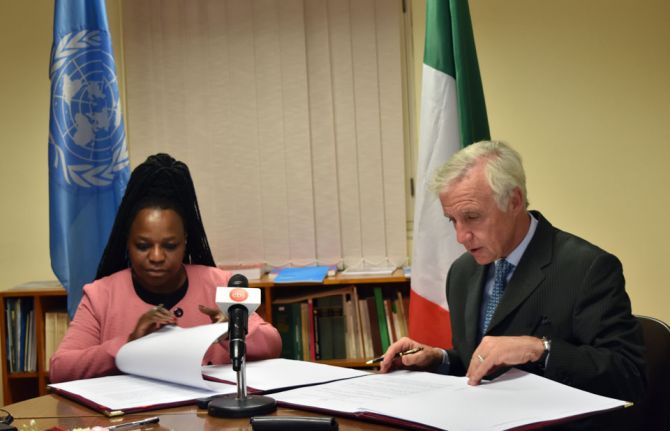
Update
Italy invests half a million euros to support UNAIDS’ work in Ethiopia
21 February 2017
21 February 2017 21 February 2017The Italian Government signed on 21 February a financing agreement for €500 000 to support UNAIDS’ efforts to end the AIDS epidemic in Ethiopia. The funds will be invested in a special project to bolster UNAIDS’ work in improving community health education and capacity- and knowledge-building. The project will be implemented across 10 areas of the Southern Nations, Nationalities and Peoples’ Region of the country over a 12-month period.
The Southern Nations, Nationalities and Peoples’ Region, situated in south-west Ethiopia, is the third most populous region in the country, home to some 17.8 million people in 2012, including 80 different ethnic groups distinguished by different languages and cultures. Around 90% of the people in the region live in rural areas, often hard to reach with essential health services. It is estimated that 14% of all new HIV infections in the country are in this region, showing the urgent need to increase HIV prevention and support services.
The joint project will focus on preventing communicable diseases in the region, including HIV, generating demand for and increasing uptake of health services for women and young people and strengthening and building the capacity of support groups for women and young people.
Ethiopia has been particularly affected by the AIDS epidemic. At the peak, in 2005, around 82 000 people died of AIDS-related illnesses. Although much progress has been made in recent years—new HIV infections among children have declined by 87% since 2000 and AIDS-related deaths by 71%—there is still much work to do. The latest estimates show that, in 2014, around 730 000 people were living with HIV in Ethiopia—two thirds of whom were women, and only half had access to treatment.
The commitment, signed in the Ethiopian capital Addis Ababa, is part of the Italian Ministry of Foreign Affairs and International Cooperation’s efforts to strengthen Italy’s engagement in the response to HIV in Ethiopia and more broadly across the African continent. UNAIDS will be working closely with the Ethiopian and Italian Governments, community partners, civil society and groups of people living with HIV to ensure that Ethiopia is firmly on the Fast-Track to ending its AIDS epidemic by 2030.
Quotes
“Today Italy and UNAIDS come up to a further step in their strong partnership and ongoing collaboration for the benefit of Ethiopian population in the field of health. I am most honoured to announce the launch of the Project in collaboration with UNAIDS, as implementing partner”.
“Italy has always been greatly committed in supporting initiatives directed to fight HIV in Ethiopia and Africa and the signature of this financing agreement further strengthens Italy’s support and dedication for such an important cause”.
“Community engagement is key to advancing equitable health care towards achieving the Sustainable Development Goal 3 on ending AIDS and other communicable and non-communicable diseases by 2030. This project will enhance Community health education for positive effect on safer sex practices, social integration and reduction of vulnerabilities.”
Region/country
Related

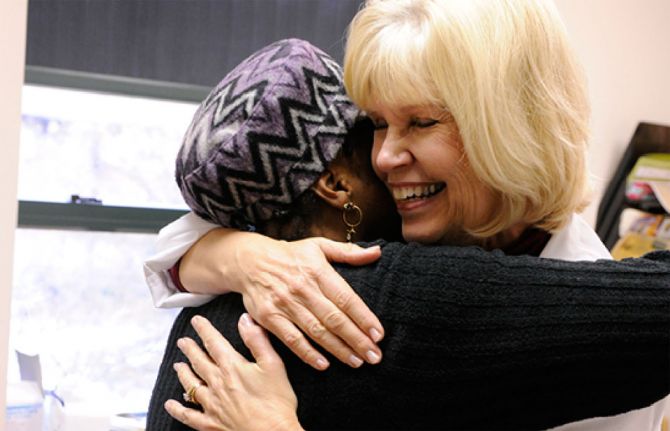
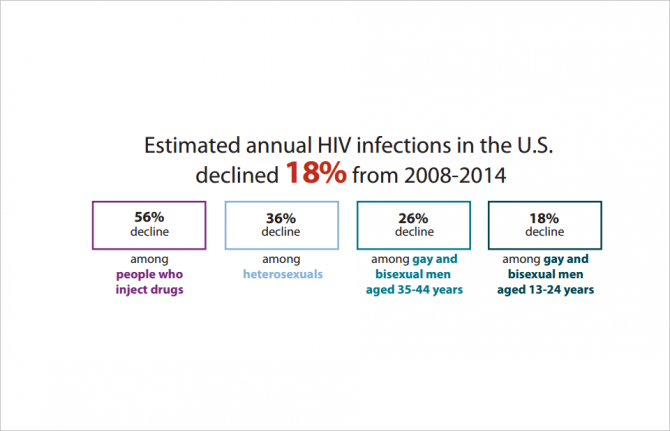
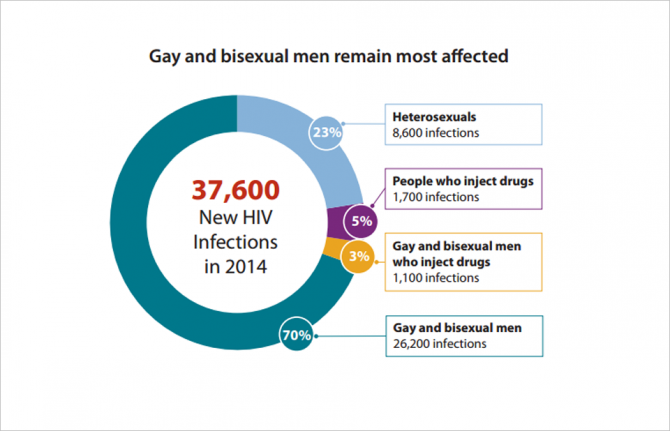
Update
New HIV infections down by 18% in the United States of America
16 February 2017
16 February 2017 16 February 2017The state of Georgia, the home to the Ponce de Leon Center in Atlanta, saw a 6% annual decline in new HIV infections between 2008 and 2014. The clinic treats more than 6000 people living with HIV. Marianne Swanson, a nurse at the clinic who is also living with HIV, told UNAIDS about the antiretroviral therapy that she and her clients take to stay healthy and to ensure that their loved ones stay HIV-free. Treatment for HIV is playing a major role in HIV prevention. New evidence released shows that annual new HIV infections in the United States of America fell by 18% between 2008 and 2014, but that not all groups are benefitting equally.
Nurse Marianne Swanson uses own experience of living w/#HIV to ensure best care for patients https://t.co/rQ0TB8SQVi via @atlantamagazine pic.twitter.com/aUjW9dTj4B
— Michel Sidibé (@MichelSidibe) February 8, 2017
The estimates were released by the United States Centers for Disease Control and Prevention (CDC) at the Conference on Retroviruses and Opportunistic Infections, taking place in Seattle, United States of America, from 13 to 16 February.
The CDC’s estimates show that while the number of new HIV infections among people who inject drugs fell by 56% from 2008 to 2014, there was no decline among men who have sex with men in the same period. The number of white and young men who have sex with men acquiring HIV dropped in the six-year timespan, but increases among other groups—most notably 25- to 34-year-old men who have sex with men, with a 35% increase—were responsible for the general flatlining of new infections among men who have sex with men in the country.
The drop in new HIV infections also varied by location, with states and districts showing drops of up to 10% annually, for example Washington, DC, while others experienced lower declines—for example Texas, with a 2% annual drop—or remained stable. No states showed increases in new HIV infections, however.
The CDC attributes the 18% decline from 2008 to 2014 in large part to the increased number of people living with HIV knowing their HIV status, accessing treatment and becoming virally suppressed—including the clients of the Ponce Center—as well as the success of past programmes for people who inject drugs and the increasing use of pre-exposure prophylaxis (PrEP). This shows the importance of the Fast-Track approach and its 90–90–90 targets for 2020 towards ending AIDS by 2030, whereby 90% of people living with HIV know their HIV status, 90% of people who know their HIV-positive status are accessing treatment and 90% of people on treatment have suppressed viral loads.
While the 18% reduction in new infections between 2008 and 2014 is very encouraging, additional tailored programmes are needed to achieve a 75% reduction by 2020, as set out in the 2016 Political Declaration on Ending AIDS.
The variance in the decline in new HIV infections among different groups of people and in different states shows the importance of a location and population approach, in which programmes are focused on the people and places that will deliver the greatest impact. CDC’s High-Impact Prevention approach plans to scale-up prevention programmes through such a location and population response.
By scaling up prevention programmes and ensuring that more people stay HIV-free, the hope is that the need of clinics like the Ponce Center, and the thousands like it worldwide, to provide HIV treatment to people living with HIV will be much less in the future.
Resources
Region/country
Related
 Government ensures continuity of treatment in Malawi
Government ensures continuity of treatment in Malawi

10 February 2025

Update
First Lady of Benin launches the Claudine Talon Foundation to improve the lives of women and children across the country
03 March 2017
03 March 2017 03 March 2017The First Lady of Benin has launched a foundation to improve the lives of the most vulnerable women and children in the western African country, nestled between Nigeria and Togo. The foundation will work under the umbrella of six core values: solidarity, the family, respect for differences, integrity, humility and efficiency.
The Claudine Talon Foundation will take a holistic approach to improving health and social outcomes for women and children in Benin. It will focus on expanding maternal and paediatric health services, improving general hygiene and sanitation, increasing access to quality drinking water, improving standards of nutrition and raising literacy rates through a wider access to education. Activities will include increasing access to HIV testing in paediatric health centres and supporting organizations caring for orphans. It will also focus on ending discrimination for people living with and affected by HIV.
Benin has made significant progress in its AIDS response in recent years, particularly in reducing mother-to-child transmission of HIV and increasing access to life-saving antiretroviral medicines. Around half of all adults living with HIV in Benin currently have access to treatment. However, key populations are still disproportionately affected by HIV. The foundation hopes to break down the stigma preventing people from accessing life-saving HIV services.
The importance of scaling up support services for women and young people in Benin is evident. Estimates show that 39% of people live below the poverty line in the country and that 45% of the population is under the age of 15.
The Executive Director of UNAIDS, Michel Sidibé, was present at the launch and said that the humility and profound commitment of the First Lady to creating a fairer and more just society will improve the lives of women and children in Benin, restoring dignity, inspiring change and creating opportunity. The First Lady thanked Mr Sidibé and UNAIDS for the support given to the foundation and to the response to HIV in Benin.
Quotes
“Today in Benin, for every 100 000 babies born, 335 women die giving birth. This is an example of the challenges we face. Women must be empowered to manage their own reproductive health and I am convinced that together we can improve the health of women and children in Benin.”
“I am very proud to support the launch of the Claudine Talon Foundation. The foundation’s emphasis on inclusion and solidarity is the keystone of successful health and development efforts. The foundation will be a driving force in creating a better future for women and children in Benin. Claudine Talon has a burning desire to give to others.”
Related




Update
One million viewers join online discussion for Zero Discrimination Day
06 March 2017
06 March 2017 06 March 2017On 1 March, more than one million viewers joined an online discussion with Vera Brezhneva, UNAIDS Goodwill Ambassador for Eastern Europe and Central Asia, to mark Zero Discrimination Day.
The goal of the event was to raise awareness of stigma and discrimination. It brought together people of different backgrounds and ages living with HIV to share their personal stories and highlight the importance of zero discrimination in health-care settings.
The discussion was part of the UNAIDS Zero Discrimination Day Make Some Noise campaign, and was cohosted by UNAIDS and the United Nations Educational, Scientific and Cultural Organization at United Nations House in Moscow, Russian Federation. The discussion was live streamed on Odnoklassniki, a leading Russian-language social media platform.
UNAIDS estimates that 1.5 million people were living with HIV in eastern Europe and central Asia in 2015, up from 1 million in 2010.
Quotes
“Silence is not an option. Let’s break down the walls of fear and prejudice that prevent people from getting friendly and effective medical care and support. Don’t be silent: stand up and speak out when people are treated unfairly.”
“Discrimination is the main obstacle for millions of people to access the life-saving services essential to end the AIDS epidemic. Access to health-care services is everyone’s right—now let’s ensure they don't have to overcome the barrier of discrimination.”
“As someone living with HIV, I am accessing HIV treatment, and I have reached an undetectable viral load. This is such a relief to know that I cannot transmit HIV to my wife.”
“The science is clear that HIV treatment is prevention and we can end the AIDS epidemic. But we need to do much more to ensure that people with special needs do not face the barrier of discrimination. This begins in my family with my beloved husband, who lives openly with HIV.”
Region/country
Related

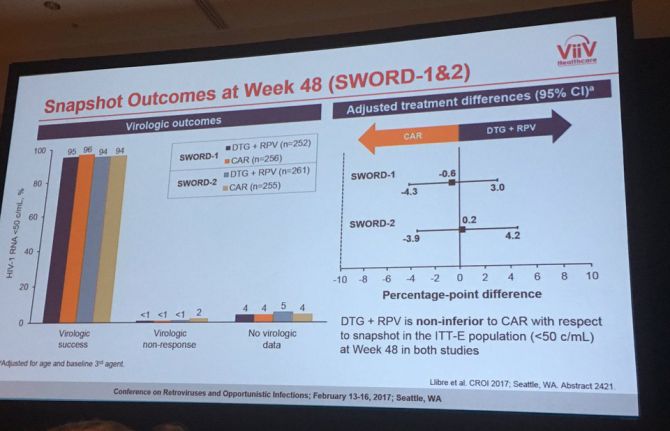
Update
CROI shows the importance of 90–90–90
21 February 2017
21 February 2017 21 February 2017A number of important updates were announced at the annual Conference on Retroviruses and Opportunistic Infections (CROI) that have shown the importance of, and ways to achieve, the 90–90–90 targets, whereby, by 2020, 90% of people living with HIV know their HIV status, 90% of people who know their HIV-positive status are accessing treatment and 90% of people on treatment have suppressed viral loads.
Held in Seattle, United States of America, from 13 to 16 February, CROI, the foremost annual scientific research conference on HIV, brought together around 4000 scientists, researchers, clinicians, students and others working in the response to HIV and related diseases.
A way of helping to meet the first 90—90% of people living with HIV knowing their HIV status—is the scale-up of self-testing. The STAR project, a four-year programme to build up HIV self-testing, has now distributed around 200 000 self-testing kits in Malawi, Zambia and Zimbabwe and is showing promising results. The project found that self-testing is a good way of reaching people who had previously not been reached before. Research is ongoing into the different ways the kits could be distributed—community-based distribution, pharmacy support, etc. With around 19 million people living with HIV not knowing that they have the virus, HIV self-testing could be a vital step towards ensuring that all who need HIV treatment have access to it.
The announcement of several promising new medicines in the pipeline may help to meet the second 90—90% of people who know their HIV-positive status are accessing treatment. A range of new single-dose, effective medicines, including new classes of medicine, new examples of existing classes and long-acting preparations that are produced by different manufacturers, will help to increase competition and hence access. Having new medicines will also be good news in the event of the development of resistance to current medicines in the future.
The importance of the third 90, viral suppression, and of a combination prevention approach to HIV was shown in a study in Rakai, Uganda. Studies of more than 33 000 people from 1999 to 2016 showed that an increase in antiretroviral therapy and hence viral suppression, scale-up of voluntary medical male circumcision and delayed sexual debut contributed to a 42% reduction in HIV incidence.
Also important for viral suppression is keeping people on treatment. The SWORD-1 and SWORD-2 studies show that a two-medicine regimen is as good as the current three-medicine approach. By reducing the amount of medicines that people living with HIV need to take, side-effects are reduced and adherence improves. Since antiretroviral therapy is taken for life, a simplification in treatment could benefit millions of people.
Resources
Related

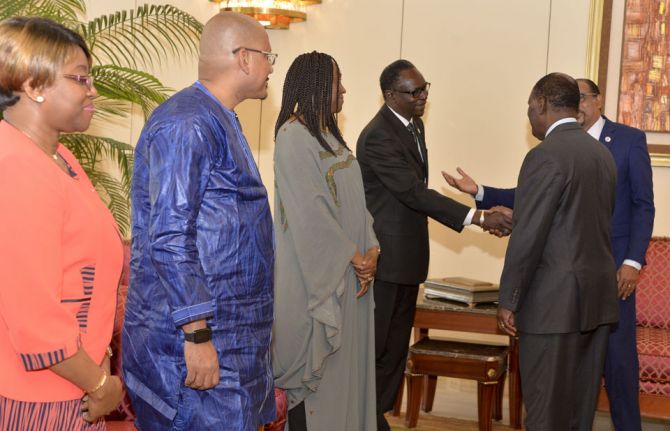
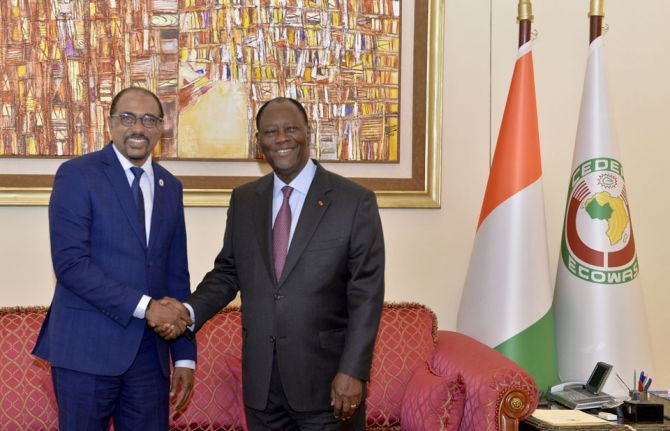
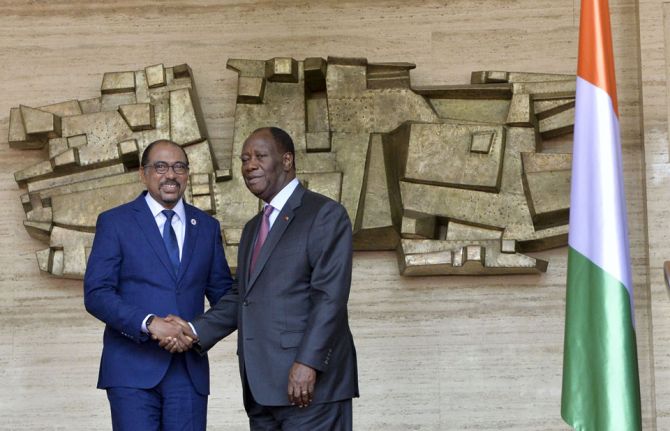
Update
Côte d’Ivoire increases domestic resources for HIV by 400%
15 February 2017
15 February 2017 15 February 2017The President of Côte d’Ivoire, Alassane Dramane Ouattara, has met with the Executive Director of UNAIDS, Michel Sidibé, during his visit to the country to speak as a special guest at the seventh session of the National AIDS Council.
During the meeting, the President and Mr Sidibé discussed the recent advances in the national response to HIV, including the reduction in new HIV infections, the reduction in AIDS-related deaths and the 25% increase in the number of people living with HIV on treatment in just one year. They also talked about the many challenges that still lie ahead, including scaling up HIV testing, access to treatment and how to avoid loss to follow-up, particularly for children.
Mr Sidibé thanked the President for the US$ 1 million contribution to UNAIDS and welcomed the considerable efforts of Côte d’Ivoire to increase domestic resources for its response to HIV by 400%.
The local production of medicines was also discussed, particularly in the context of western and central Africa, where only one person in four currently has access to treatment.
The President thanked UNAIDS for its continued support to the response to HIV in Côte d’Ivoire and agreed to be a champion for UNAIDS’ catch-up plan for western and central Africa, which will ensure that more people across the region have access to essential HIV prevention and treatment services.
Quotes
“We have made significant efforts at the domestic level by increasing the budget allocated to the fight against AIDS. Global solidarity and shared responsibility must go hand in hand.”
“The 400% increase in the resources allocated to the AIDS response in Côte d’Ivoire very clearly reflects the commitment of President Ouattara to ensure that no one is left behind. This is a clear step towards shared responsibility and to ensuring the sustainability of HIV programmes in Côte d’Ivoire.”












